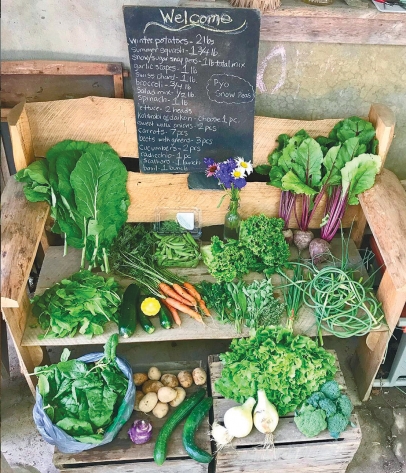8 Reasons to Join A Community Supported Agriculture Program
Members of the community financially commit to supporting the farmer before the growing season, either with the payment of a one-time membership fee or a series of installments.
Ever since the Community Supported Garden at Genesis Farm was founded in 1988, Community Supported Agriculture (CSA) programs have been plentiful throughout New Jersey. An estimated 100 programs or more are now available, from the top of the state in Sussex County to its sandy bottom in Cape May.
A CSA represents a direct relationship between a community and its farmer. Members of the community financially commit to supporting the farmer before the growing season, either with the payment of a one-time membership fee or a series of installments, with total costs ranging from $500 to $1,000 per season, depending on the type of CSA program selected (weekly, biweekly, year-round, etc.).
In exchange for the up-front payment, the farmer pledges to provide farm products in reasonable abundance to the best of his or her ability to satisfy the community’s needs during the harvest season. The farmer and the community further agree to share the bounty as well as the risks, or losses, inherent in farming. This relationship works best when there is mutual trust between the community and the farmer.
If you’re thinking about joining or rejoining a CSA program, these eight reasons might persuade you to commit for the 2019 season.
1FRESH, NUTRITIOUS FARM FARE
A primary motivation to become and remain a happy CSA member is the regular access to fresh, locally grown, nutritious food. Since CSA farmers know the number of members in advance, the daily harvest can be more precise, with far less shelf time for products to degrade. This results in a shorter window between the farmer’s harvest and the enjoyment of the fruits of the farmer’s labor by CSA members. Most CSA farmers strive for this window to be the shortest possible time, harvesting just a few hours before distributing the harvest to members.
2 AFFORDABILITY
A well-managed CSA can be an affordable way to include fresh farm products in your day-to-day life, as it represents a direct relationship between the farmer and members, without the added costs of middlemen. CSA members also may be less likely to waste food, since having a direct connection to the food producers may encourage enthusiastic eating and less waste.
3 HEALTHIER CHOICES
Most Americans eat less than the recommended daily amount of produce, and the produce they do consume is not very diverse. However, research has shown that CSA members increase their produce consumption, have a greater willingness to try unfamiliar produce and are likely to make other changes that increase the overall quality of their diets.
4 COMMUNITY CONNECTIONS
For most CSA members, picking up their boxed shares requires a weekly or biweekly visit to the farm or pick-up site. On-farm visits are an opportunity for members to get to know each other as well as the farmers. Farm newsletters allow members to develop greater farm and food literacy by increasing their understanding of the joys and challenges of farming. Many CSAs offer farm events, pick-your-own crop privileges, farm camps and volunteer opportunities, deepening community connections.
5 OPTIONS TO FIT YOUR VALUES AND DIETARY PREFERENCES
There’s a CSA in New Jersey for nearly every diet. For vegetarians, there is no shortage of farms offering exclusive vegetable, herb, flower and fruit shares (some available year-round). Some farms even have egg-only CSAs, and at least one farm in the state includes its own popcorn, cornmeal and whole wheat flour in its shares. If supporting a certified organic produce or livestock farm is important to you, there are plenty offering CSAs. And if the idea of patronizing a CSA program tied to the vision of a religious, educational or environmental nonprofit appeals to you, several CSAs offer that option as well.
6 MORE ETHNICALLY DIVERSE SELECTIONS
Jersey’s CSA members are ethnically diverse, so many CSA farmers actively seek crop recommendations from their members, sometimes even asking members to help them locate culturally appropriate seed sources. With this direct connection to their community, CSA farmers can quickly satisfy emerging demand for food items that were not formerly part of the farm’s repertoire.
7 DISTINCTIVE FOODS
As CSAs have matured and responded to members’ desires for more varied selections of food items, a few have diversified their product lines to include native fruits such as persimmons and pawpaws, as well as tropical spices like turmeric and ginger. A growing number of CSA farmers offer grains and mushrooms, and one organic farmer is producing heirloom dried shelling beans with interesting names like Tiger’s Eye, Lina Sisco’s Bird Egg and Tongues of Fire, exclusively for his members. A few CSA farmers process their farm bounty into ketchup, sauerkraut, tomato sauce, tomato puree and salsas to distribute to their CSA members.
8 SHARING THE CHALLENGES OF CLIMATE CHANGE
The CSA movement, in part, was started by farmers who were inspired by the farm financial crisis of the 1970s and ’80s to develop a less risky method to produce food for their communities. Since their inception, CSAs have done a great job of helping farmers manage financial and other challenges.
Today’s farm crisis is climate change. New Jersey farmers will be further challenged by longer growing seasons, warmer summers (including an increased number of heat waves), milder winters, more frequent flooding and heavier rains, unprecedented weather patterns and weather events that may force some farms into financial ruin if they are not supported by their community.
Farmers will need to adjust to these rapid changes in growing conditions while developing their responses to increases in the number, severity and variety of weeds, diseases and insect pests. Livestock farmers will need to increasingly contend with the effects climate change has on the health of not only of their animals, but farm workers as well. Farmers will need to develop solutions to help them continue to farm responsibly, and CSA members’ financial and emotional support during periods of transition is a meaningful and important contribution, now and in the years ahead.
EDITOR’S NOTE: Most CSA programs are now accepting members for the 2019 season. Visit findjerseyfresh.com or ediblejersey.com for a list of farms offering CSAs.







